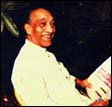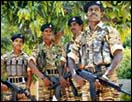The Rediff Special/J N Dixit
'The LTTE's insistence on the creation of a separate
Tamil state would have far-reaching negative implications
for India's unity'
 Rajiv Gandhi had come to the conclusion that neither the Sri Lankan
government nor the Tamil groups, especially the LTTE, would reach
any agreement and come to a durable compromise unless India took
a direct hand in the matter. He had become sceptical about President J R Jayewardene's
intentions and was clearly disappointed at the obdurate attitude
of the LTTE and other Tamil groups.
Rajiv Gandhi had come to the conclusion that neither the Sri Lankan
government nor the Tamil groups, especially the LTTE, would reach
any agreement and come to a durable compromise unless India took
a direct hand in the matter. He had become sceptical about President J R Jayewardene's
intentions and was clearly disappointed at the obdurate attitude
of the LTTE and other Tamil groups.
My advice to him after the
failure of our initiatives at the Bangalore SAARC summit was that
India's purely mediatory efforts were not likely to succeed. I
was of the view that India had to shift its role from that of
a mediator to a peace-maker and the guarantor of such peace if
the crisis in Sri Lanka was to be resolved.
It was also my considered
opinion that the LTTE's insistence on the creation of a separate
Tamil state in Sri Lanka, based on ethnic, linguistic and religious
considerations, would have far-reaching negative implications
for India's unity and territorial integrity too. The LTTE's clandestinely
publicised objective of a Greater Eelam would have its impact
notably on India but the rest of South-East Asian countries with
Tamil populations.
I was convinced that the LTTE's objective of
creating a separate political entity, purely on the basis of language,
ethnicity and religion, would be a challenge to the plural multi-dimensional
democratic identity of India as well as other similarly placed
countries in the region.
Having seen the LTTE in operations, both
in the political and military fields, I also felt that, despite
the legitimacy of the Tamil aspirations articulated by it, the
LTTE was essentially an authoritarian organisation that relied
on violence to settle all differences of opinion.
 An example of the mindset of LTTE leadership is provided by a
report about a journalist asking Prabhakaran some time during
1986 as to who were his role models in politics and military operations.
First came Subhas Chandra Bose in all the power and majesty of
his position as the supreme commander of the Indian National Army.
An example of the mindset of LTTE leadership is provided by a
report about a journalist asking Prabhakaran some time during
1986 as to who were his role models in politics and military operations.
First came Subhas Chandra Bose in all the power and majesty of
his position as the supreme commander of the Indian National Army.
The other ideal Prabhakaran mentioned was the American actor Clint
Eastwood in his personification as the hero who avenged injustice
with ruthless violence. I cannot vouch for the total authenticity
of this story for the simple reason that this was not said to
me. But I am inclined to believe in the veracity of such a response
by Prabhakaran, given his intense commitment to the Tamil cause
and his personality as a militant leader. My suggestions to Rajiv
Gandhi were based on these assessments.
A series of meetings amongst Indian officials were held under
the chairmanship of Minister of State Natwar Singh, Foreign Secretary
K P S Menon, and the prime minister himself. There were in-depth
discussions between July 19 and 21, about the possible ramifications
of India and Sri Lanka signing a bilateral agreement (without
Tamil participation) to resolve the ethnic crisis.
I distinctly
remember Rajiv Gandhi raising the question as to whether the LTTE
would really abide by the agreement, which India was bound to
implement as a guarantor. Rajiv Gandhi raised this question in
the context of the doubts and misgivings Prabhakaran had expressed
when Hardeep Puri provided details of the agreement to him on
July 19.
Rajiv's question was primarily addressed to the then secretary
of the Research and Analysis Wing, S E Joshi, who was cautious
in his response. He said the LTTE was not a very trustworthy
organisation and the agreement in a manner went against their
high-flown demand for Eelam. Joshi was about to retire. His successor
Anand Verma's response was that the LTTE owed much to India's
support, that it was the LTTE which conveyed the message to N
Ram of The Hindu, which initiated the whole process of
discussions on the proposed Agreement.
Verma expressed the view
that if the LTTE was guaranteed an important role in the power
structure in the Tamil areas of Sri Lanka, and if the merger of
the northern and eastern provinces was somehow made permanent (whatever
be the interim political arrangements proposed) and if the LTTE
cadres were absorbed into the administrative set-up of the new
province, the LTTE would endorse the agreement, especially as
it was being guaranteed by India. The general tenor of his advice
was that "these are boys whom we know and with whom we have
been in touch and so they will listen to us."
My colleagues Gopi Arora, IB Director Narayanan, Foreign
Secretary Menon and Joint Secretary Kuldip Sahdev had doubts
about the LTTE falling in line. I shared their worry to some extent,
which prompted me to raise two questions in one of these meetings.
First, whether MGR and the Tamil Nadu leadership would endorse
the Agreement?
Secondly, if the LTTE created a situation, after
the Agreement was signed, which might compel us to exert pressure
on it to remain committed to the Agreement, would we be able to
do it successfully?
 Rajiv Gandhi said he had been in touch
with MGR and other Tamil leaders, and that they were supportive
of the Agreement. On the second question, about the implications
of India having to confront the LTTE, Rajiv Gandhi asked the then
chief of the army staff General K Sundarji what his assessment
was.
Rajiv Gandhi said he had been in touch
with MGR and other Tamil leaders, and that they were supportive
of the Agreement. On the second question, about the implications
of India having to confront the LTTE, Rajiv Gandhi asked the then
chief of the army staff General K Sundarji what his assessment
was.
The general's reply was that once the LTTE endorsed the Agreement,
they would not have the wherewithal to go back and confront India
or the Sri Lankan government. He went on to say that if the LTTE
decided to take on India and Sri Lanka militarily, Indian armed
forces would be able to neutralise them militarily within two
weeks. So, there need not be any serious worry on this score.
While the TULF and Tamil militant groups other than the LTTE endorsed
the Agreement without any fundamental reservations, the LTTE clung
to its misgivings till the end. Mainly because of three reasons.
A political compromise and the revival of the democratic process
in the Tamil areas of Sri Lanka would deprive the LTTE of its
dominant political and military role.
Secondly, the Agreement did not ensure the total withdrawal
of the armed forces from the Tamil areas of Sri Lanka. Nor did
it specifically provide for the return of large number of Tamils
to areas around Vavunia in the northern and the upper reaches
of the Mahaveli Ganga river basin from where they were evicted.
Successive Sri Lankan governments had evicted Tamil residents
from these areas and settled Sinhalese in these areas so that
the Sinhalese could benefit from the development projects and
the new agricultural lands being created as part of the Mahaveli
River Basin Development plans. Tamil resentment at being deprived
of this land was valid.
The LTTE wanted these grievances to be
redressed. Realistically speaking, there was no prospect of persuading
any Sri Lankan government to vacate these lands, after having
made them (the Sri Lankan government) concede the merger of the
northern and eastern provinces and declaring merged provinces
a Tamil homeland.
Thirdly, the LTTE wished to be recognised as the sole representative
of all Sri Lankan Tamils. They were not happy about New Delhi
and Colombo acknowledging other Sri Lankan Tamil groups as partners
in implementing the compromises envisaged in the Agreement.
These were the concerns and anxieties with which Prabhakaran arrived
in Delhi on July 23. The discussions he had with Indian officials,
the chief minister of Tamil Nadu and Rajiv Gandhi have already
been related. Two additional points of interest in terms of the
assurances given to Prabhakaran deserve to be mentioned.
First, both the chief minister of Tamil Nadu and Rajiv Gandhi
assured Prabhakaran that LTTE would be a major constituent element
in the interim government of the proposed merged North-Eastern
Provinces. Second, that the Government of India would give the
necessary financial assistance to maintain the LTTE cadres before
they got absorbed into the administration of the new province.
 Prabhakaran had pointed out to Rajiv Gandhi that since 1983, he
was sustaining his cadres by imposing taxes on the population
of Jaffna and marginally in the Trincomalee and Batticaloa districts
whenever possible. He said since he was going to surrender
arms and as it would take time for his cadres to be absorbed into
the administration and police forces, he would have to take care
of his cadres. He demanded about three to five crores of rupees
(Rs 30 million to Rs 50 million) for this purpose for a period of six to eight months.
Prabhakaran had pointed out to Rajiv Gandhi that since 1983, he
was sustaining his cadres by imposing taxes on the population
of Jaffna and marginally in the Trincomalee and Batticaloa districts
whenever possible. He said since he was going to surrender
arms and as it would take time for his cadres to be absorbed into
the administration and police forces, he would have to take care
of his cadres. He demanded about three to five crores of rupees
(Rs 30 million to Rs 50 million) for this purpose for a period of six to eight months.
I was not
present at these discussions, but I was informed about them by
the concerned agencies. Prabhakaran wanted this money to be distributed
through his local commanders on the basis of his estimates and
suggestions. Rajiv Gandhi agreed and these resources were channelled
to the LTTE as far as I know, through the concerned agencies of
the Government of India.
Excerpted from Assignment Colombo, by J N Dixit, Konarak Publishers, 1998, Rs 400, with the publisher's permission.
Readers interested in obtaining a copy of the book may direct their enquiries to Mr K P R Nair, Konarak Publishers, A-149, Main Vikas Marg, New Delhi 110 001.
Tell us what you think of this feature
|



